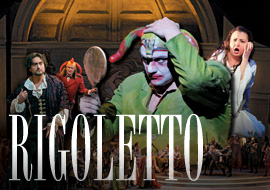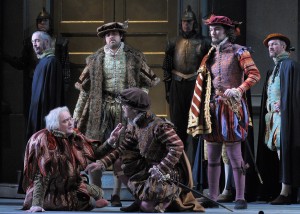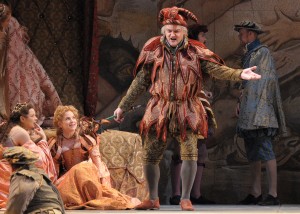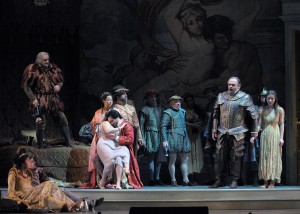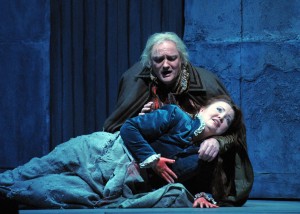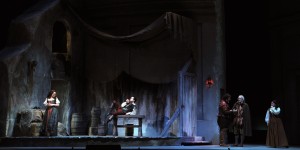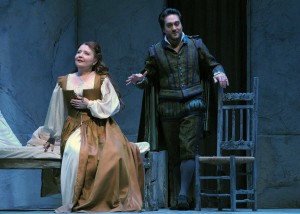RIGO-LENTO
After a season chock full of successes, Lyric’s momentum slows with a dull production of Verdi’s Rigoletto. Not even Evan Rogister’s expert conducting nor the orchestra’s triumphant execution of Verdi’s score could buoy opening night’s dragging performances.
The show opens with a single spotlight illuminating a violent sexual encounter between the Duke of Mantua (a mischievous Giuseppe Filianoti) and a young girl. Another strategically brightened area of the stage illuminates a guard ignoring the terrible scene, highlighting the duke’s power and foreshadowing how rich men can get away with whatever injustices they inflict. For these first few moments, Duane Schuler’s lighting paints the opera with a dark, mysterious tone and remains the most cleverly conceived portion of the production.
At a gathering in his palace the Duke of Mantua brags about his promiscuity and asserts his authority while reveling with other men’s wives. The unpopular hunchbacked jester Rigoletto (a tired Andrzej Dobber) annoys the duke’s guard at the party and they plot to kidnap the woman whom they believe to be his mistress, but who is in fact his daughter, Gilda (Albina Shagimuratova).
To keep his daughter safe, Rigoletto has not told anyone about her, and allows her to leave the house only for church on Sundays. But even with these restrictions, the Duke manages to win her heart, following her home after every mass and pretending that he is a poor student. Once Gilda is kidnapped she learns the truth about the duke and his lecherous ways and feels betrayed. Even though her heart is broken, she foils her father’s plans to have the duke murdered thus causing a tragic turn of events.
As Rigoletto, Dobber hardly demands attention. His tenor voice sounds hollow and the chemistry between him and Shagimuratova resonates just as weakly. (Željko LuÄić assumes the role of Rigoletto March 14-30.) Though Shagimuratova has a strong, almost burly, soprano she was a bit miscast for the role. During her aria “Caro nome,” when she’s happily falling in love for the first time, the weight of her voice feels incompatible with her character’s lightness and naiveté. That being said, she provides a haunting depth to her heart-breaking duets with Dobber: “Tutte le feste al tiempio,” “Piangi fanciulla,” and “V’ho ingannato” – “Lassù… in cielo.” The extraordinarily talented Shagimuratova simply cannot sing both sides of this character.
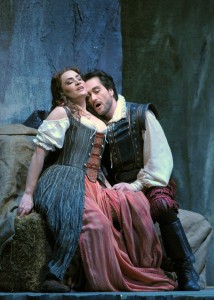 The stars are stiffly staged by director Stephen Barlow, who massively underutilizes the ensemble as well. In the opening scene at the duke’s palace, the ensemble is practically inert, no more than mannequins to show off Jane Greenwood’s beautiful earth-toned costumes. And when the ensemble kidnaps Rigoletto’s daughter Gilda, wearing only black capes, they choke the stage with rigidity and darkness. Barlow really misses the opportunity to use the ensemble as a fierce and threatening force.
The stars are stiffly staged by director Stephen Barlow, who massively underutilizes the ensemble as well. In the opening scene at the duke’s palace, the ensemble is practically inert, no more than mannequins to show off Jane Greenwood’s beautiful earth-toned costumes. And when the ensemble kidnaps Rigoletto’s daughter Gilda, wearing only black capes, they choke the stage with rigidity and darkness. Barlow really misses the opportunity to use the ensemble as a fierce and threatening force.
Thankfully, Act III ends the show on a high note. It is full of drama, trickery and tragedy and takes place at a dilapidated inn, designer Robert Innes Hopkins’ most intricate and interesting set piece at last Monday’s opening. Despite a powerful last few scenes and arias, it’s too little too late. Without passion or urgency, the story ultimately falls flat and is quite forgettable.
photos by Dan Rest/Lyric Opera of Chicago
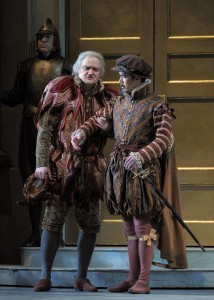 Rigoletto
Rigoletto
Lyric Opera of Chicago
Civic Opera House
20 N. Wacker Drive
ends on March 30, 2013
for tickets, call 312.827.5600 or visit Lyric Opera
for more shows, visit Theatre in Chicago
